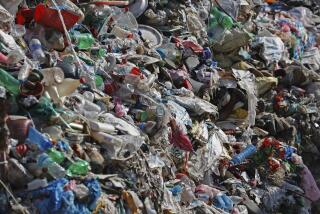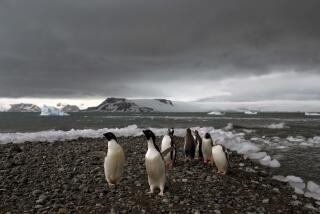Waste, Pollution Threaten Antarctica, but Conditions Are Improving : Environment: Nations such as the United States are making a big effort to clean up scientific stations after pointed criticism.
- Share via
PALMER STATION, Antarctica — Tin cans still line the shelves in Captain Robert F. Scott’s hut, which has barely changed since he left it 80 years ago for the South Pole, never to return.
The bitter cold and dry air of the world’s last wilderness leave almost everything freeze-dried in Antarctica--a frozen storehouse for more than two-thirds of the world’s fresh water, and a place where no more rain falls than in the Sahara Desert.
Scientists seeking clues to how the world’s climate has changed find a 150,000-year record in the Antarctic ice cap, which is as much as 3 miles deep near the South Pole.
However, the harsh conditions that preserve this planetary record and monuments to some of the world’s most intrepid explorers also preserve the waste they leave behind.
Until this century Antarctica, home to little more than birds, seals and a few plants, was the cleanest place on Earth. That, however, is being slowly changed by scientific research, which began on the continent in 1957.
Environmental groups such as Greenpeace already have pinpointed abuses, including oil spills, abandoned machinery, rubbish dumps and the piping of untreated sewage into once-pristine waters.
The main culprit, environmentalists say, are the bases where scientists try to unravel the complex interaction of atmosphere, ice and sea that help regulate world weather.
Although 39 Antarctic Treaty nations have maintained the continent as a peaceful international scientific preserve for 30 years and have agreed to freeze territorial claims, many countries see it as a question of national pride to maintain a base here.
There are now as many as 40 year-round bases and another 20 or so in the short summer months, each with its own rubbish problem.
Waste and pollution not only threaten the environment, they also endanger experiments for which the clean environment is crucial.
Countries such as the United States are now making a big effort to clean up their act after pointed criticism.
In 1988 Greenpeace and the Environmental Defense Fund criticized the National Science Foundation, which overseas U.S. polar research, for burning rubbish and dumping untreated sewage.
A year later, Antarctic Treaty nations tightened up a code of conduct on waste disposal, calling for the removal of any toxic or radioactive waste and other garbage. Last year Washington created a special clean-up budget for the polar program.
The changes are beginning to show at this U.S. base on the Antarctic Peninsula, which is on the other side of the continent from McMurdo, where Scott’s base is preserved.
Rubbish is now sorted and recycled or shipped out. Dumps are being cleared up. An old station is slowly being dismantled.
The biggest change is in attitude.
“Over the years there have been too many people who had a nine-month tour, and their attitude was, ‘Leave it for the next guy,’ ” William Woodward, an oil spill expert working as a consultant for the Science Foundation, said in an interview.
“Now there is a new approach and things are really looking up. . . . They’re making great strides forward,” he said.
Mike Patterson, a construction supervisor who has worked at American bases at McMurdo and the South Pole, said: “There has been an incredible swing toward concern for the environment.”
Greenpeace, however, says more can be done and some nations are still not committed to keeping Antarctica clean.
Just before a monthlong cruise to Antarctica in February to monitor the ecological impact of scientific bases, Greenpeace detailed some of the continuing abuses, such as the Argentine base where 30 years worth of debris has been thrown down a mountainside.
“We intend to keep bringing facts back to the public of those countries about how their governments should really behave in Antarctica,” Greenpeace campaigner Janet Dalziell said.
For the people who work in Antarctica and have sampled its magic, the cleanup makes sense.
Patterson, a former welder in a nuclear plant whose seven years in Antarctica have not diminished his awe of the continent, said: “This place is a little too special to be spoiled.”
More to Read
Sign up for Essential California
The most important California stories and recommendations in your inbox every morning.
You may occasionally receive promotional content from the Los Angeles Times.













